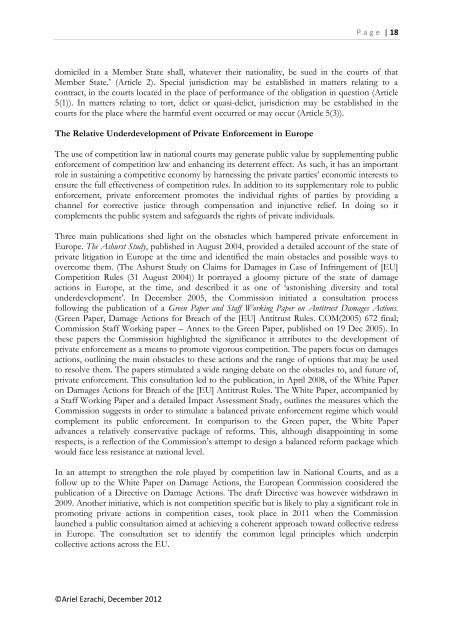EU Competition Law and Policy - compal
EU Competition Law and Policy - compal
EU Competition Law and Policy - compal
Create successful ePaper yourself
Turn your PDF publications into a flip-book with our unique Google optimized e-Paper software.
©Ariel Ezrachi, December 2012<br />
P a g e | 18<br />
domiciled in a Member State shall, whatever their nationality, be sued in the courts of that<br />
Member State.’ (Article 2). Special jurisdiction may be established in matters relating to a<br />
contract, in the courts located in the place of performance of the obligation in question (Article<br />
5(1)). In matters relating to tort, delict or quasi-delict, jurisdiction may be established in the<br />
courts for the place where the harmful event occurred or may occur (Article 5(3)).<br />
The Relative Underdevelopment of Private Enforcement in Europe<br />
The use of competition law in national courts may generate public value by supplementing public<br />
enforcement of competition law <strong>and</strong> enhancing its deterrent effect. As such, it has an important<br />
role in sustaining a competitive economy by harnessing the private parties’ economic interests to<br />
ensure the full effectiveness of competition rules. In addition to its supplementary role to public<br />
enforcement, private enforcement promotes the individual rights of parties by providing a<br />
channel for corrective justice through compensation <strong>and</strong> injunctive relief. In doing so it<br />
complements the public system <strong>and</strong> safeguards the rights of private individuals.<br />
Three main publications shed light on the obstacles which hampered private enforcement in<br />
Europe. The Ashurst Study, published in August 2004, provided a detailed account of the state of<br />
private litigation in Europe at the time <strong>and</strong> identified the main obstacles <strong>and</strong> possible ways to<br />
overcome them. (The Ashurst Study on Claims for Damages in Case of Infringement of [<strong>EU</strong>]<br />
<strong>Competition</strong> Rules (31 August 2004)) It portrayed a gloomy picture of the state of damage<br />
actions in Europe, at the time, <strong>and</strong> described it as one of ‘astonishing diversity <strong>and</strong> total<br />
underdevelopment’. In December 2005, the Commission initiated a consultation process<br />
following the publication of a Green Paper <strong>and</strong> Staff Working Paper on Antitrust Damages Actions.<br />
(Green Paper, Damage Actions for Breach of the [<strong>EU</strong>] Antitrust Rules. COM(2005) 672 final;<br />
Commission Staff Working paper – Annex to the Green Paper, published on 19 Dec 2005). In<br />
these papers the Commission highlighted the significance it attributes to the development of<br />
private enforcement as a means to promote vigorous competition. The papers focus on damages<br />
actions, outlining the main obstacles to these actions <strong>and</strong> the range of options that may be used<br />
to resolve them. The papers stimulated a wide ranging debate on the obstacles to, <strong>and</strong> future of,<br />
private enforcement. This consultation led to the publication, in April 2008, of the White Paper<br />
on Damages Actions for Breach of the [<strong>EU</strong>] Antitrust Rules. The White Paper, accompanied by<br />
a Staff Working Paper <strong>and</strong> a detailed Impact Assessment Study, outlines the measures which the<br />
Commission suggests in order to stimulate a balanced private enforcement regime which would<br />
complement its public enforcement. In comparison to the Green paper, the White Paper<br />
advances a relatively conservative package of reforms. This, although disappointing in some<br />
respects, is a reflection of the Commission’s attempt to design a balanced reform package which<br />
would face less resistance at national level.<br />
In an attempt to strengthen the role played by competition law in National Courts, <strong>and</strong> as a<br />
follow up to the White Paper on Damage Actions, the European Commission considered the<br />
publication of a Directive on Damage Actions. The draft Directive was however withdrawn in<br />
2009. Another initiative, which is not competition specific but is likely to play a significant role in<br />
promoting private actions in competition cases, took place in 2011 when the Commission<br />
launched a public consultation aimed at achieving a coherent approach toward collective redress<br />
in Europe. The consultation set to identify the common legal principles which underpin<br />
collective actions across the <strong>EU</strong>.



